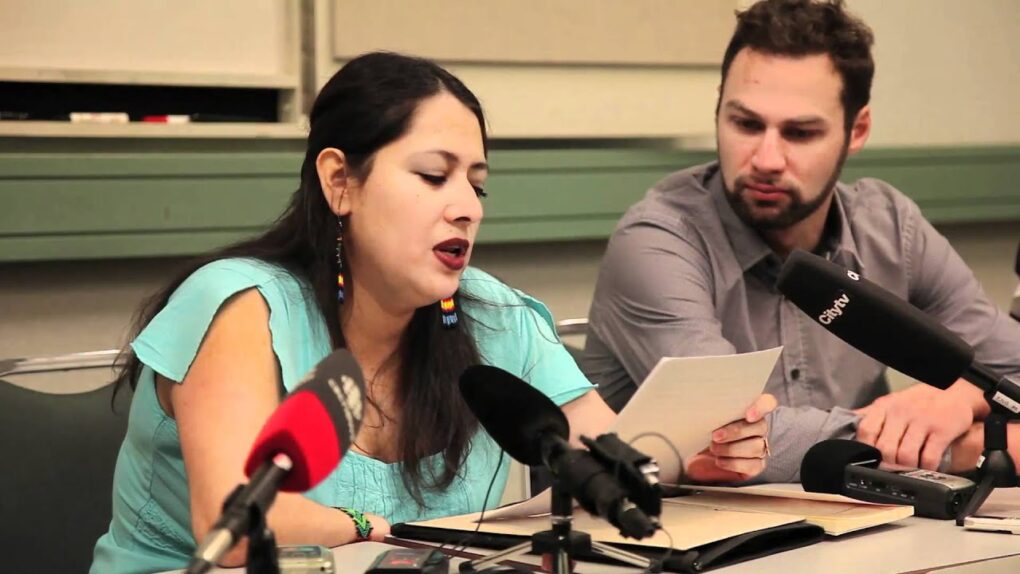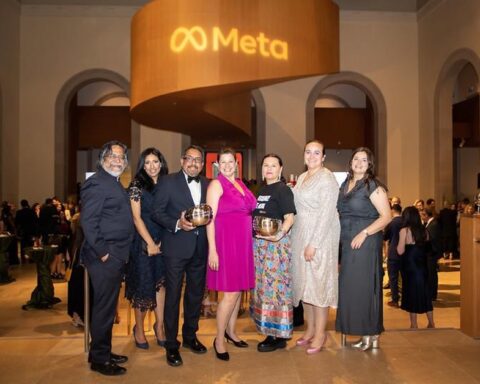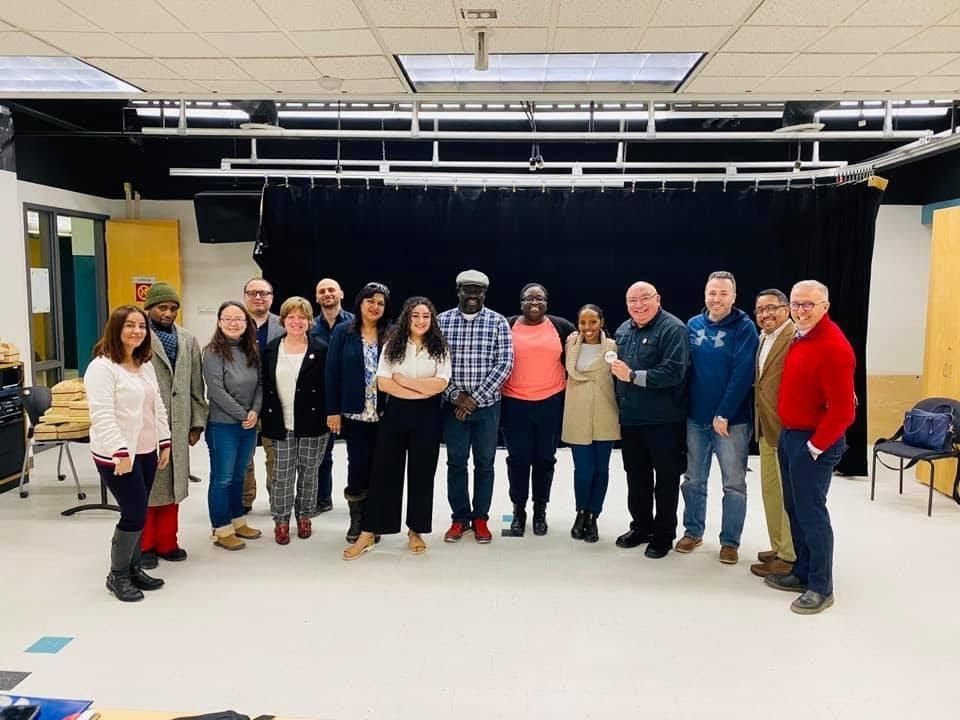Growing up in Mexico, Karla Lottini’s passion was to pursue a career in journalism and shine a light in the dark corners of her homeland.
After a stint with a Cancun newspaper, where she wrote about crime, human rights, and politics, Lottini got a job as a writer with Mexico’s National Council for Culture and Arts in 2001.
There, she found that a group of powerful people were part of a corrupt network siphoning funds with ghost invoices and getting kickbacks.
“I released thousands of documents to the media and soon after that I was targeted with death threats and threats to my family,” said Lottini, preferring to use her penname. Her real name is Karla Berenice García Ramírez.
“It was not safe for me or my family anymore in Mexico, so I escaped to Canada with my husband in 2008,” she told New Canadian Media.
“My dream was to land a job with a mainstream media outlet like (the Canadian Broadcasting Corporation) and continue exposing the corruption that plagues Mexico,” said the mother of two.
After a lengthy battle with Immigration Canada to convince them that she and her husband should be allowed to stay, the couple were granted status in the country.
Her dream of being a full-fledged journalist at a mainstream outlet, however, remains elusive.
“You go for interviews, and you get asked about having Canadian experience,” she says. “How do you get that without being given a chance to get Canadian experience?”
“When it comes to freelancing, the media outlets either want you do it for free or a small amount with which you cannot feed your family or cover expenses,” says Lottini, who works as an educational aide in Surrey, British Columbia.
Struggling to break into the industry
Lottini’s plight is reflected in a new study of immigrant and refugee journalists, which shows that less than one-third of immigrant and refugee journalists are employed in the Canadian media industry.
And over one-half of these journalists make less than $40,000 a year, according to the study which was conducted by members of the New Canadian Media (NCM) Collective.
Citing data from Immigration, Refugees and Citizenship Canada (IRCC), the study reveals that between 2010 and 2020, Canada welcomed over 800 permanent residents as “journalists” through Express Entry and other visa programs. The figure excludes asylum seekers and refugees.
“Even though 85% of migrant and refugee respondents have worked in journalism for over five years and 87% would like to continue their career as journalists, many struggle to break into the Canadian media industry due to self-reported issues such as socioeconomic limitations, sparse work opportunities, and language barriers,” the study states.
The study, titled “Breaking into the Canadian media industry: economic and social barriers for first-generation immigrant and refugee journalists,” analyzed 101 detailed, written survey responses and involved 47 oral interviews.
“The immigrant journalists who responded to our study were a diverse group that hailed from all over the world — a significant number came from India, France, Bangladesh, and the Philippines. More than half of respondents were already Canadian citizens or permanent residents. Only 33% reported that they are currently working as journalists,” the study finds.
“This first-of-its-kind study provides remarkable insight into the challenges many immigrants encounter when attempting to find work as journalists in Canada,” Brent Jolly, national president of the Canadian Association of Journalists, is quoted as saying in a press release.
“It paints a picture of the need for dynamic new approaches, programs, and opportunities to ensure that the rich lived experience of many journalists from around the world, who choose to come to live in Canada, are included in our ongoing national conversations.”
Most of the refugee journalists involved in the study were from Latin America, the Middle East, South Asia, and Sub-Saharan Africa. Political persecution and violence in their home countries were the main reasons for seeking asylum in Canada.
“While all would like to break into the Canadian media industry, all but one is working in sectors other than in journalism,” it states.
A work of passion
Andrew Griffith, a policy analyst and former director general of IRCC’s Citizenship and Multiculturalism Branch, suggested the study should have also had a “comparison with non-immigrant journalists to assess the greater difficulty immigrant journalists face.”
“In an ideal world there would be more opportunities to practise journalism, including for journalists who are immigrants,” he told NCM.
For Lottini, like others involved in the study, their passion for journalism is kept alive through volunteering or working with smaller and ethnic media outlets.
She has co-hosted a Latin Affairs radio program as a volunteer and published her book, Talent of Charlatans (El talento de los farsantes), based on the corruption she uncovered in Mexico.
Last year, Canada enacted a dedicated refugee stream for “human rights defenders,” including journalists, who may need to seek asylum to escape persecution in their home countries.
The stream — the first of its kind in the world — will accommodate 250 people a year, plus their families, and focus on people with heightened risk, such as women, journalists and LGBTQ2 rights advocates, according to the IRCC.
NCM will be holding a Virtual Colloquium on April 2 to share the results of the study and discuss the implications for the media industry in Canada.
A multiple-award winning journalist, Fabian Dawson is an internationally acclaimed author, filmmaker and media expert. His work over the last four decades spans the globe and he also serves as a consultant/strategic advisor to a variety of international companies. As deputy editor-in-chief of The Province, part of the Postmedia chain, Dawson led initiatives within a special publications group to provide directed content for a variety of organisations. He was named the 2019 recipient of the Bruce Hutchison Lifetime Achievement Award at Jack Webster Awards. Dawson has been invited by the governments of India, Malaysia, Taiwan, China, Hong Kong and the United States to act as a media observer/advisor on a variety of Asian-Canada issues. Dawson, now operates FD Media, which specializes in harnessing editorial assets to revenue generating opportunities.






I found the following paragraph problematic from an ethics point of view:
“I released thousands of documents to the media and soon after that I was targeted with death threats and threats to my family,” said Lottini, preferring to use her penname [sic]. Her real name is Karla Berenice García Ramírez.
It could work if more context were given for revealing her real name, but it appears to be absent anywhere elsee in the article. Nor, is it explained why it is necessary to reveal her true identity, if she prefers her alias or pen name, especially for reasons of personal security.